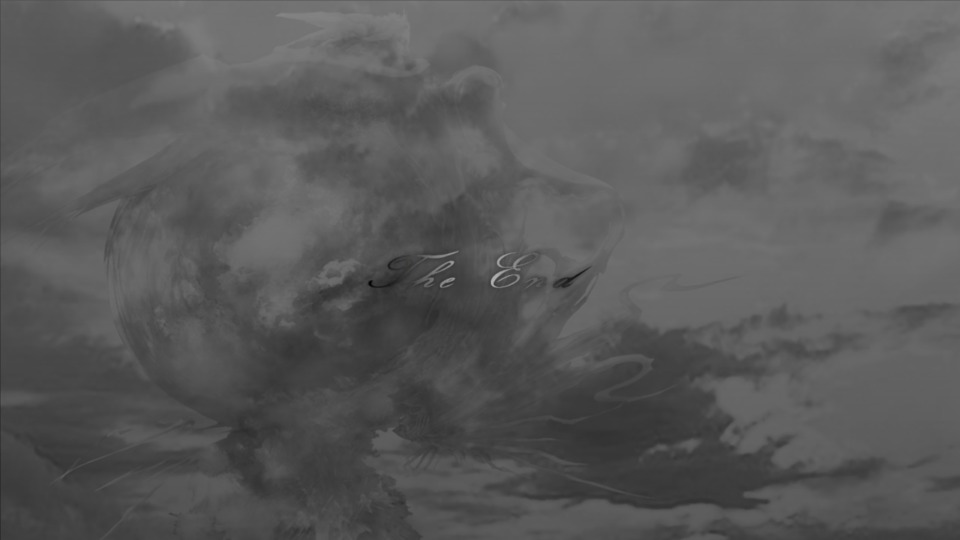Fighting Final Fantasy XIII - Episode 5: This Game Killed Final Fantasy AND Square-Enix!
By ZombiePie 42 Comments
AUTHOR'S NOTE: Here are links to the previous episodes of this series. Sorry for the delay on this episode.
- Fighting Final Fantasy XIII - Episode 1: This Game Has The Worst Introduction In Video Game History!
- Fighting Final Fantasy XIII - Episode 2: Yo Square, How Do You Make A JRPG Without ANY Good Characters?
- Fighting Final Fantasy XIII - Episode 3: I Guess Square-Enix Forgot How To Write A Good Final Fantasy Story
- Fighting Final Fantasy XIII: Episode Four - I'm The Only Person Brave Enough To Tell You The Truth: Gran Pulse SUCKS!
Part 41: The Story Is Total Nonsense
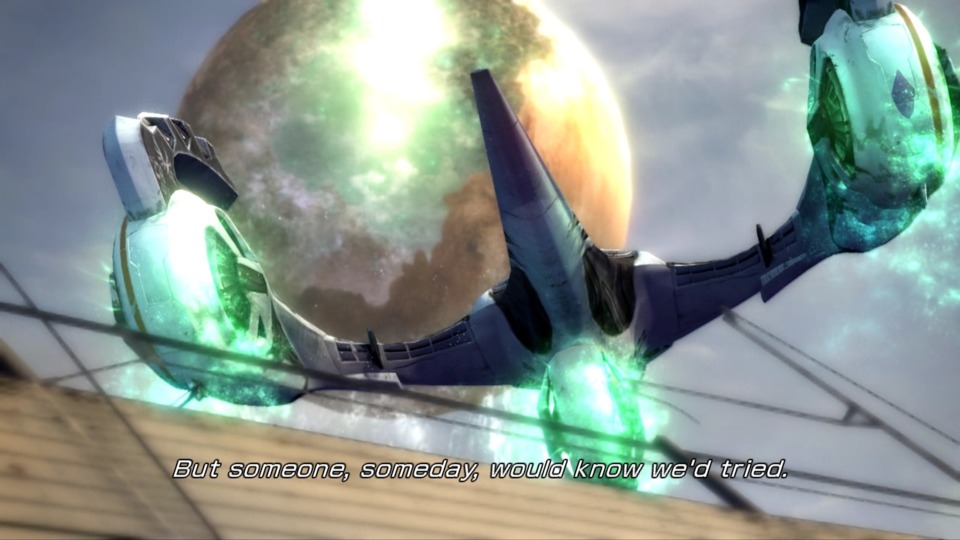
I have yet to meet a Final Fantasy XIII apologist willing to defend its story. Commonly, supporters cite the game's mechanics as a highlight. Others express affection for its art design or visuals. However, these advocates concede Final Fantasy XIII's mainline story is a dumpster fire. The cast is inconsistent; there are no memorable characters; the antagonist is ill-defined; things happen at a whim; the general plot is incomprehensible. It's a piss poor storytelling effort on Square's part especially when you consider their legacy. For years, they were the studio to count on for epic fantasy tales.
To clarify, the scaffolding for the main narrative is a patchy and frayed network. In the beginning, our motley crew lives on a planet called "Cocoon." On Cocoon, there exists a pantheon of gods called "fal'Cie." The leader of these gods, Barthandelus, wants to sacrifice humanity to the god of creation. For one reason or another, Barthandelus is tired of tending to humanity's needs. Rather than lead Cocoon through a spiritual awakening, he precipitates an act of genocide. This premise guides the story, and it is here where Final Fantasy XIII falters.
While I understand the story's leading actors, there's no grounding on why everything unfolds the way it does. On a whim, Barthandelus assumes he can summon an omnipotent being called "The Maker." However, we never see this figure in the game. Somehow, Barthandelus is an expert on things that have never happened. Similarly, our party is intimately connected with Barthandelus' scheme. For instance, Vanille and Fang share a destiny in becoming an apocalyptic figure known as "Ragnarok." Luckily for Barthandelus, Ragnarok is one of the few deities capable of killing him, thus setting into motion the possible end of the world.
It seems like a "red thread of fate" guides every twist in Final Fantasy XIII. Regrettably, Final Fantasy XIII doesn't use the theme of "predestination" to its advantage. In fact, I would hazard to say there isn't a central idea to Final Fantasy XIII's narrative. In chapter two, the story vaguely hints at a government conspiracy. By section three, Sanctum is a pseudo-fascistic military-industrial complex. At some point, the story devolves into stopping the Apocalypse, and the game never justifies this turn of events. Before any of you accuse me of back-seat writing, let's look at Final Fantasy VII as a case study. Like Final Fantasy XIII, Final Fantasy VII starts modestly and becomes cataclysmic by its end. However, every twist and turn in Final Fantasy VII sticks with you. Without a doubt, no one forgets Final Fantasy VII's final ac, but the same cannot be said about Final Fantasy XIII.
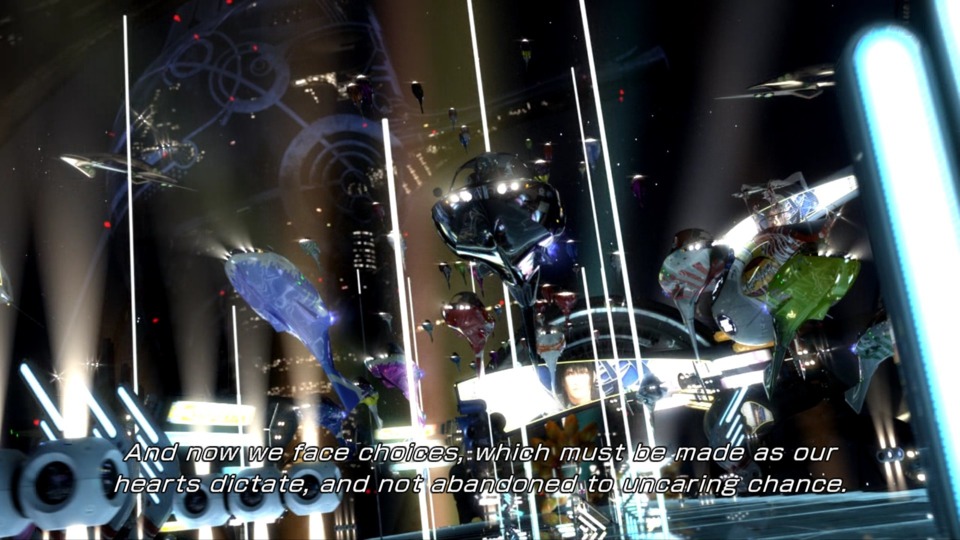
Case and point, I dare anyone to describe three non-cutscene character moments in Final Fantasy XIII, and I suspect this task is impossible. One reason for this problem is the game lectures you for hours and fails to set aside time for you to process new information. Likewise, the game transitions to new environments without scaffolding. There's a distinct lack of character dialogue when exploring new environments. While Final Fantasy XIII's levels are objectively beautiful, they are stunningly superficial. To illustrate, I know I spent hours at the Gapra Whitewood and Sunleth Waterscape, but I would be hard-pressed to name a single accomplishment at either location.
Therein lies another pressing issue with Final Fantasy XIII. The story haphazardly moves from one set piece to the next without breathing room. Between chapter twelve and the credits, the player witnesses four distinct environments. Each level looks different from the previous one, but there's nothing connecting these environments. Every level exists in its own little bubble. Sure, there are monsters, but they don't feel like they are part of an ecosystem. The same sentiment applies to the game's cityscapes. You'll interact with the occasional NPC, but they are a far cry from the well-renown worldbuilding of past Square-Enix games.
Part 42: What Is Happening? Why Am I Here? Who Are These People?
When we last met, our intrepid explorers affirmed a desire to defeat Barthandelus. I wish to remind you, Barthandelus said killing him would set into motion the end of the world. He wants to die. For some reason, no one in our party addresses this fact as we invade Eden. Additionally, the characters never establish what they hope to accomplish on Cocoon. When we last set foot on the planet, the characters were chased away by the planet's populace. Seriously, what the fuck are they going to do?
Admittedly, the Siege of Eden is a marvelous affair. It's a change of pace after the game meanders on Pulse. If there is one problem, it's the editing. Final Fantasy XIII's action cutscenes feature a dizzying number of close-ups and quick cuts. Often, the cutscenes use extreme close-up as establishing shots and jump cut to a different character without warning. Similarly, these cutscenes feature an obscene amount of motion blur. The use of motion blur is especially problematic when everyone's Eidolon looks like a Michael Bay Transformer. It's undoubtedly flashy, but likely to give you a headache after ten minutes.
I'm willing to concede chapter twelve starts decently. Despite its faults, the establishing cutscene does wonders to instill an action-packed tone. Moreover, it provides much-needed worldbuilding. In an earlier cutscene, we see Cid Raines performing stately responsibilities in place of Galenth Dysley. It's far from perfect, but the story has momentum. Therefore, it's a damn shame Square builds upon your anticipation with the same godawful level design that plagues the rest of the game! With Pulse behind us, we are back to navigating linear hallways populated by trash mobs.
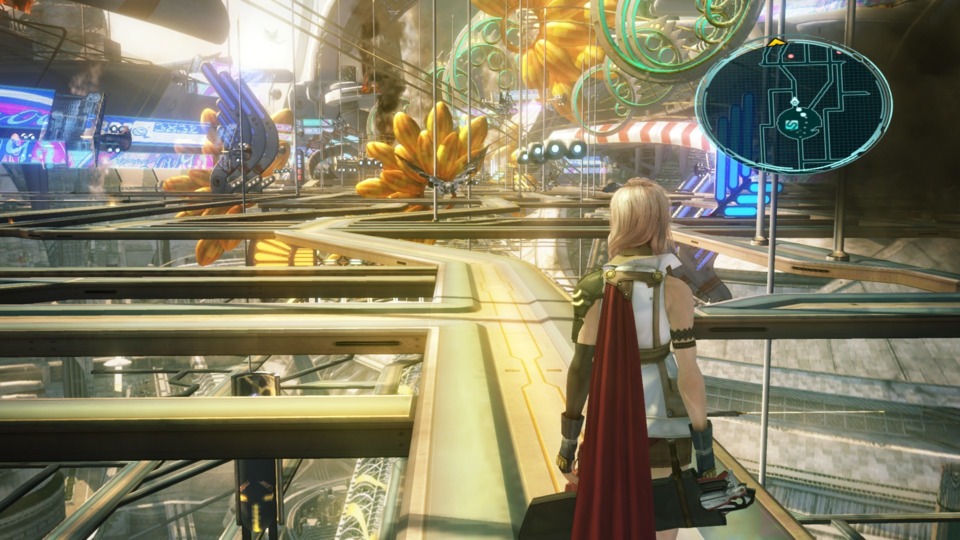
What a rude awakening! The corridors on Eden are as narrow as they were in chapter one, and at this point, their purpose is nakedly transparent. That is to say; the passageways force players into random encounters. To add insult to injury, the monsters on Eden are palette-swapped versions of shit you've seen before. Earlier, the game took great strides to remind us we are amidst a grand conclusion. Unfortunately, no individual part of Eden conveys this sense. I don't know about you, but linear corridors do not get my blood pumping.
The game tries to remedy this shortcoming by barraging you with nostalgia. Remember Snow's friends from the train heist? Well, they are inexplicably here and briefly cheer up Snow. On top of that, you fight Yaag Rosch twice, and Rygdea pops out of nowhere to put Cid out of his misery. At this point, the character interactions unfold at a breakneck speed. Nevertheless, these moments do not lead to anything substantial. To illustrate, after Snow has his touching moment with his friends, they are never mentioned again.
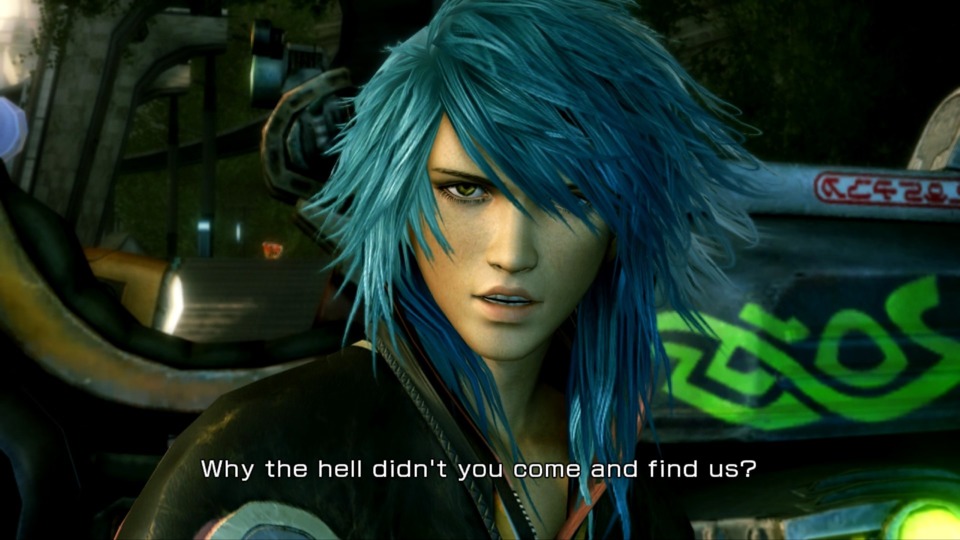
The game's superficiality is even worse when it pines for melodrama. In particular, when Rygdea takes out Cid, it treats the act as an event worth lamenting. Nevertheless, it's hard to feel emotional when Cid is barely a character in the story. The same could be said about Yaag Rosch. When Rosch sacrifices himself, the game tries to frame the moment as redemptive. Even so, this moment lacks any emotional resonance. For pity's sake, Yaag Rosch speaks for less than an hour and spends 97% of the story acting like an irredeemable bastard.
Part 43: The Gameplay Is Broken
A common complaint about my Final Fantasy XIII series pertains to my lack of commentary about its gameplay. To my defense, there's not a lot to break down. Final Fantasy XIII's menu system sticks out like a sore thumb and does not meld well with the real-time pace of the combat. Furthermore, the menus place a barrier between the player and gameplay. I especially found this to be the case whenever encountering the boss battles.
Granted, I enjoyed some of Final Fantasy XIII's gameplay exploits. Two commonly cited "cheats" are the Eidolons and character-specific abilities. Both are monstrously advantageous to use when in a pickle. If you must know, I used both to cruise through the final chapter. Nonetheless, both highlight a recurring issue in Final Fantasy XIII: this game plays dirty. Simply put, the last two levels aren't fun to play. By the time you reach the last boss, the game becomes a drawn-out exercise.
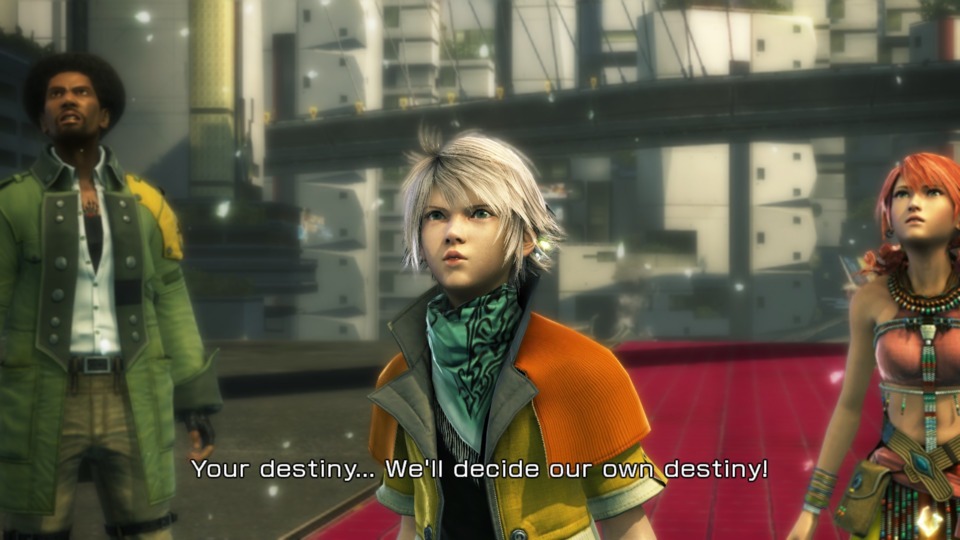
Littered throughout Eden are Behemoths, Juggernaughts, Adamantoises, and Vernal Harvesters. While your characters are indeed stronger, these battles are not push-overs. More than that, everything takes forever to beat. A single fight against a Tyrant takes approximately five to ten minutes, and this doubles if it summons its sword. That's a lot of wasted time on enemies that do not progress the story. All the same, Eden features just as many narrow walkways as previous environments. Thus, avoiding these battles is impossible unless you use Deceptisols.
These issues are partly why I have no problem exploiting Final Fantasy XIII's gameplay. The first exploit I found came in the form of the Eidolons. Whenever I felt like my party was about to get blasted, I summoned an Eidolon to act as a damage sponge. Equally important, when Eidolons leave, your party is reset to full health. This strategy proved critical in the latter stages of the game when facing bosses. What is more, Eidolons have finishing moves that can easily defeat non-boss enemies. Their only drawback is they reset the stagger meter when they leave the battle, but this is a minor quibble.
This point leads us to the most broken part of the game: the Full ATB skills. Each character has a unique attack that absorbs their entire ATB meter. You can find these attacks on one of the character's Crystariums. The nature of these attacks may differ, but the results are the same. These attacks negate any defensive bonuses enemies have during a battle. To illustrate, Hope's special attack is called "Last Resort," and does non-elemental magic damage while ignoring all resistances. Other special moves add new depth to the combat. For example, you can use a paradigm shift during Lightning's "Army of One" maneuver to exponentially increase her damage output.
There are a few limitations worth addressing. First, your A.I. controlled companions never use these abilities. When in combat, only the player-character can perform these attacks. Additionally, the game isn't clear these moves exist. The game never tutorials the "unparalleled attacks," and assumes you remember Limit Breaks from previous Final Fantasy games. Finally, the placement of these attacks on the Crystarium is bizarre. For instance, Fang and Snow are solidly the game's tanking options, but their special attacks are in their Commando skill tree. This case is one example of the late-game abilities not building upon the primary utility of the characters.
Regardless, these two mechanics make grinding and winning easier! So, what's not to like? Well, there's an elephant in the room. The game's deeper mechanics do not reward you with cinematic battles or new ways to play. These mechanics speed up the process of completing the game. Utilizing a balanced party, complemented with stylish attacks, will save you time when you go toe to toe against a boss. Lamentably, there's nothing in the game to encourage you to play this way. If you do not value your time, you could finish Final Fantasy XIII using one Commando and two Medics. The game doesn't make ridiculous parties like these nonviable. Thus, it doesn't reward you for investing in its sub-systems.
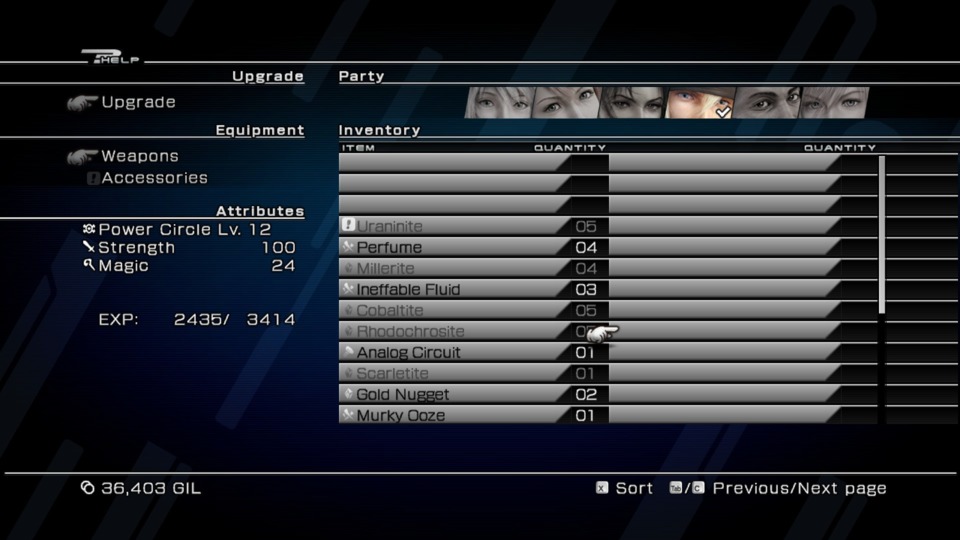
Part 44: The Late-Game Bosses Are Bullshit
Let's review the story following chapter twelve's introductory cutscene. After making a dramatic entrance, Lightning and company find the streets of Eden in a mess. Monsters from Pulse have invaded, and the city appears to be in turmoil. In a supporting cutscene, Rygdea kills Cid, and an all-out war begins. How our characters plan on stopping that war is not immediately apparent. Moreover, the game presents flashy visuals without any grounding in the world. Sure, you can walk up to random NPCs and hear a sob story, but these moments are inadequate in contextualizing the devastated cityscape.
To make matters worse, the characters never stop to think about their present circumstances. The characters blaze a path of destruction and never look back. There are no enlightening soliloquies or moments of self-actualization. Eventually, our motley crew recognizes The Calvary are mounting an attack on Sanctum. This scene does a lot to hamper your enjoyment of the characters. With the world on fire, none of them are allowed to help out those in need. You'd imagine characters like Snow or Hope would jump at the opportunity to perform heroics. Instead, the game creates stakes by manufacturing a false sense of urgency.
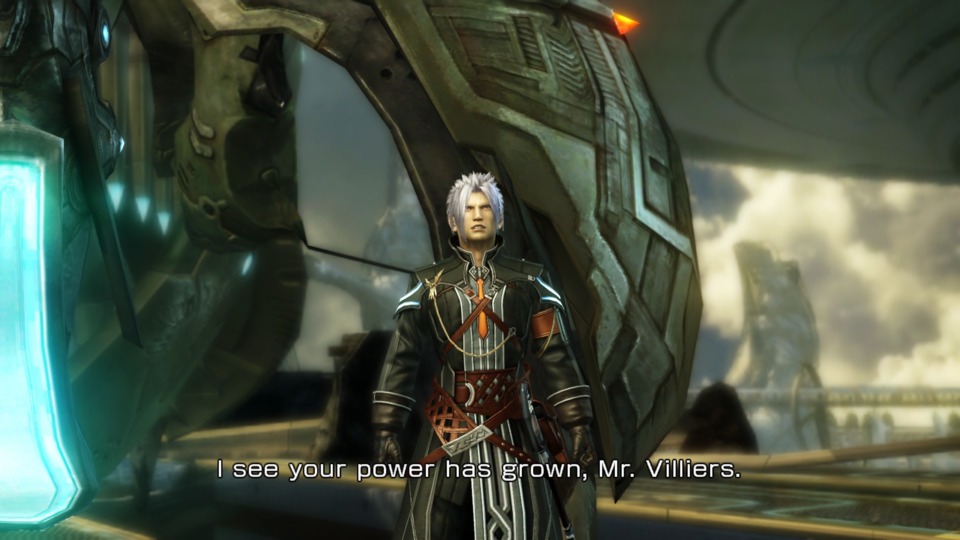
You end up fighting Yaag Rosch twice. Unfortunately, each battle is a colossal pain in the ass. The first fight inverts the game's staggering mechanic. Here, Yaag Rosch becomes stronger if you stagger him. While this gimmick is annoying, it pales in comparison to the second encounter. After fighting countless Tyrants, Juggernaughts, and Behemoths, Yaag Rosch again accosts your party. Worth mentioning, the level before this battle is excruciating. Seriously, why does the game make you fight twenty goddamned Behemoth Kings?
The designer of the Proudclad boss must be a sadist. Yaag Rosch can seamlessly ignore your Sentinels and is immune to every status effect. As someone who spent hours leveling up Vanille's Saboteur abilities, I felt especially insulted. Moreover, this battle is a grind in and of itself. The Proudclad spams the same attack with no noticeable cooldown. These attacks will stagger your party and prevent you from inputting commands. This problem has a domino effect because every action that does not inflict damage represents lost time. Spending three turns healing your party is lost time. Using items to alleviate ailments is lost time. Tanking for five turns is lost time.
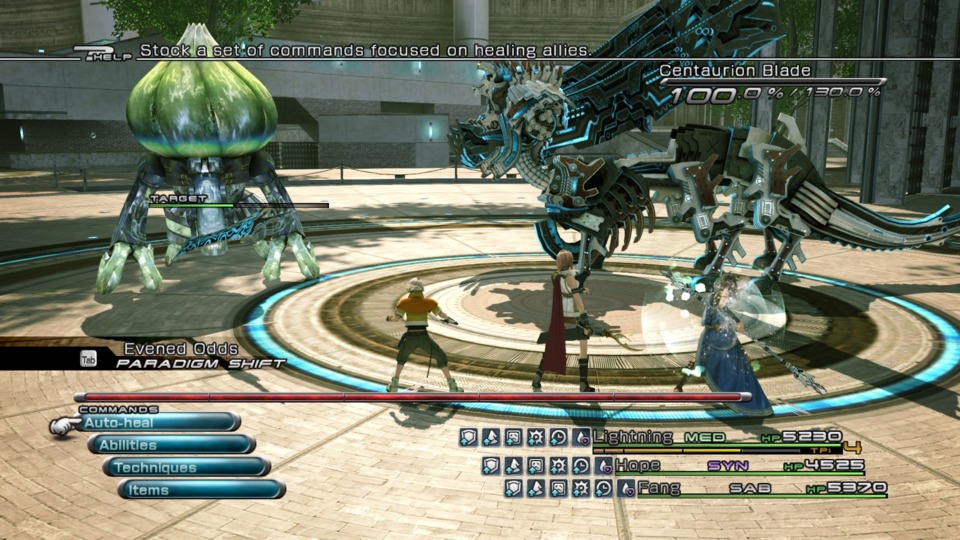
The subsequent boss battles do not fare better. The final boss battle is something I can only imagine playing in the eighth circle of Hell, but the ones preceding it are equally intolerable. It's not as if there's a critical concept or conceit you need to divine to make the battles easier. The big baddies are bullshit. They stagger your party and deal a ton of damage, and there's nothing stopping them. To boot, several of them have a suit of immunities that render your support classes useless.
Furthermore, luck defines too many of the late-game bosses. Some will hit you with every status effect in the game, and others cast Doom. There's very little you can do to prepare for these attacks. If they hit, you lose. If they miss, you win. Finally, the game recycles bosses more times than I can count. Fighting the Bandersnatch and Jabberwocky twice in a row isn't fun. It's a waste of my goddamned time.
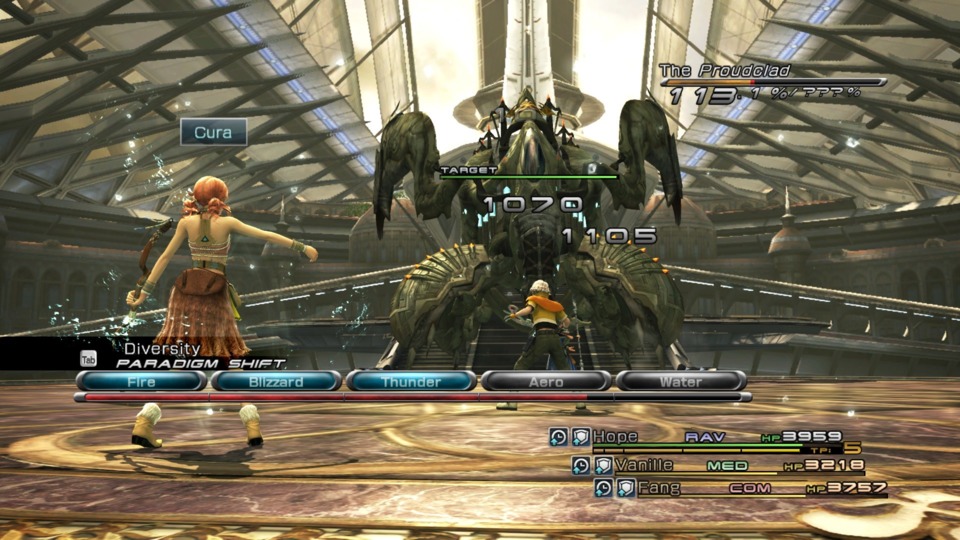
Conversely, let's return to the Proudclad. Often, the boss interrupts your character's animations while they are queuing up an attack. Your ATB meter resets whenever its barrage lands. I want to emphasize, you do not get your time back as you have to re-select your commands when this happens. Additionally, the Proudclad can cast several buffs on itself in one salvo. Removing these buffs removes a third of your party from dealing damage. In the end, this battle took me a solid thirty minutes to complete. Admittedly, at no point was my party in jeopardy. Simply put, it took forever to finish because I often needed to make up for lost progress.
Part 45: Every Level Is The Same
After a bit of pomp and circumstance, Yaag Rosch sacrifices himself to protect our party from a swarm of monsters. I would say more, but the game doesn't dwell on the matter for too long and transitions to a dizzying Tron-inspired landscape. Our party enters Orphan's Cradle wherein they discover the soldiers from the Calvary have become Cie'th. After a bit of fussing about, two statuesque figures greet Lightning and shift the platforms. At no point do the characters stop to question who these figures are, or what they are doing. Moreover, and I don't know why, but the writing makes a notable turn for the worse.
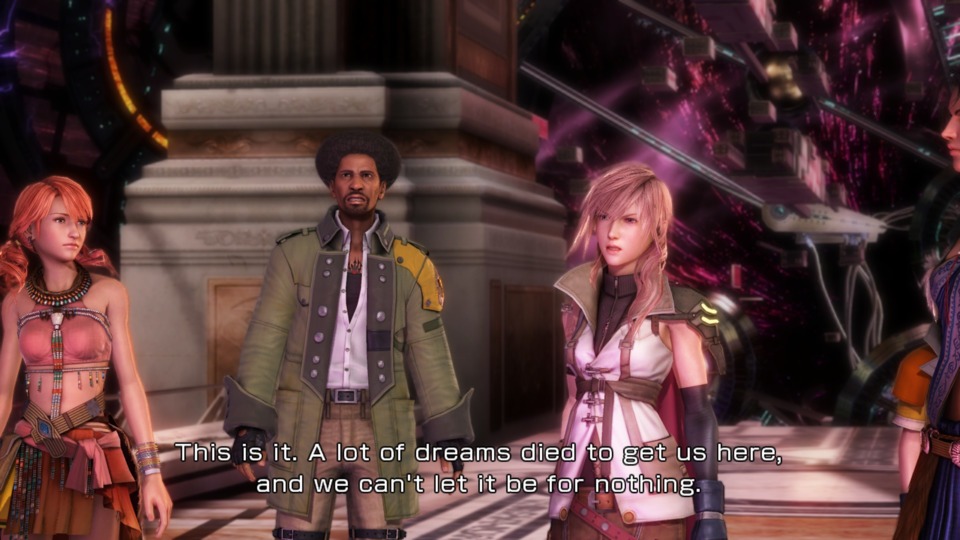
Wait a minute; this level looks oddly familiar. These platforms seem suspiciously identical to the platforms from before. I swear I have seen this shit before. Trust me on this, let's take a gander at some of the levels from chapter one.
| Levels From Chapter One | Level From Chapter Thirteen |
|---|---|
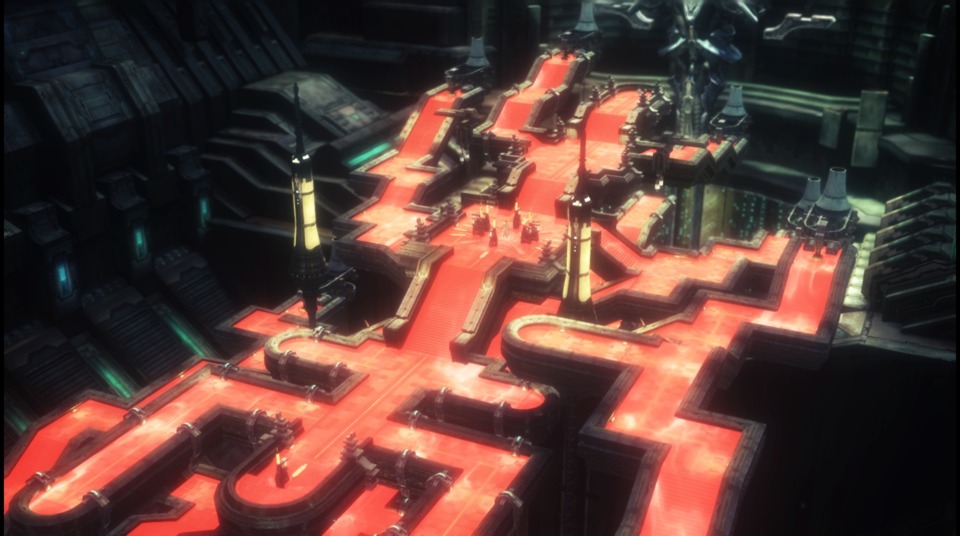 | 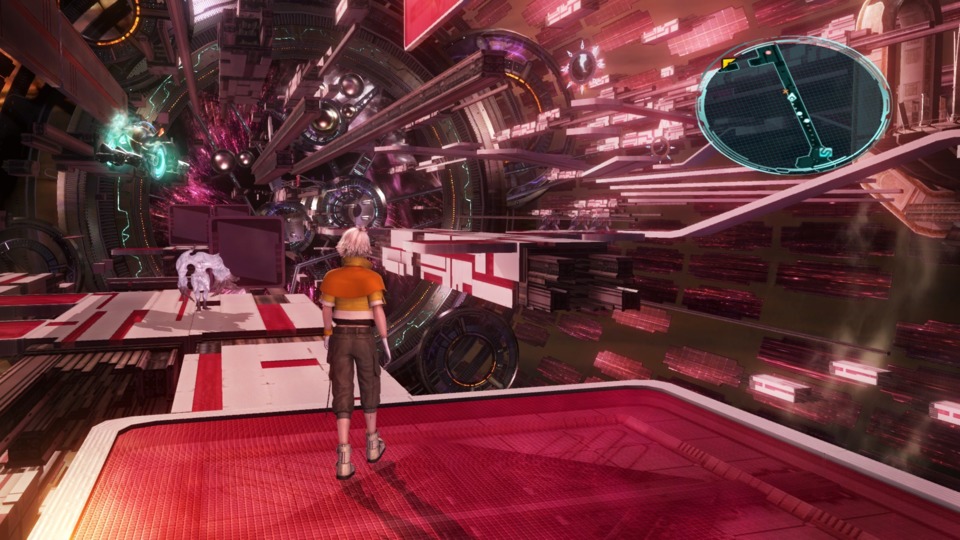 |
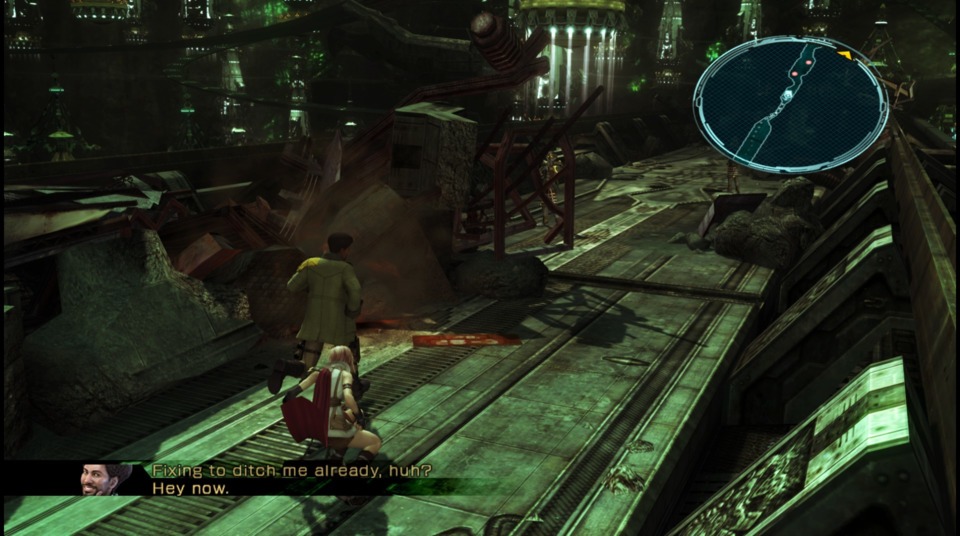 | 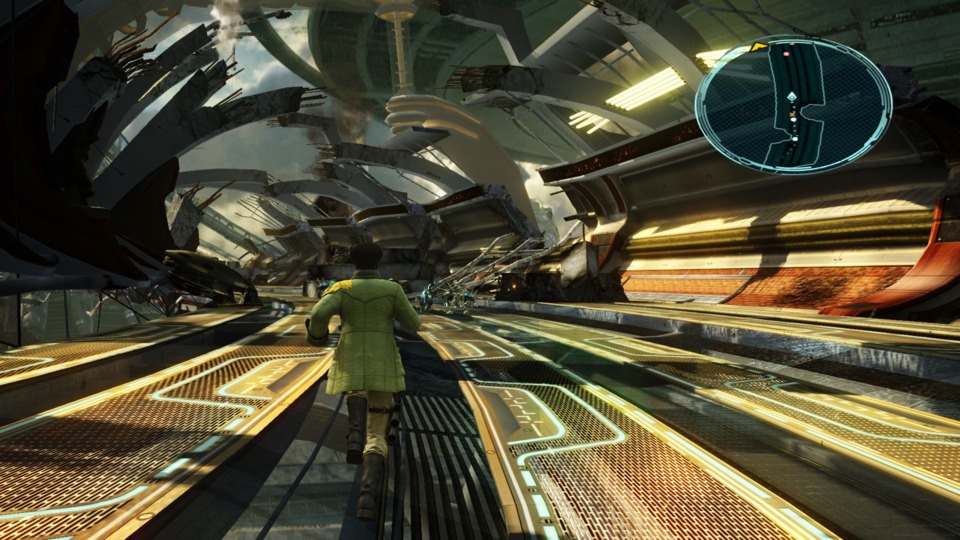 |
FUCK THIS NOISE! This game's design is atrocious. This level plays the same as every environment preceding it. There's no puzzle to discern. The trash mobs play out as they did in chapter one. Orphan's Cradle is the climactic final level in the game, but nothing about it reminds you of this fact. How did Square-Enix spend five years programming this game and not realize their copy paste design was BULLSHIT? I know I spend a fair amount of my time lampooning Square, but at the end of the day, they have some of the smartest design talents in the world. You cannot tell me their staff is incapable of making levels that are more fun than walking through linear hallways. Like I said last month, it's not a secret recipe that disappeared when a Polish cafeteria lady died.
What's more, the story's final act loses virtually all of its momentum, and this misstep is by design. After shifting the platforms of Orphan's Cradle, three portals appear. One transports the party to Gran Pulse, one to Edenhall, and a final one takes you to the next level. I understand Final Fantasy XIII is a video game, but previous Final Fantasy games had better "points of no return." The best example of this is Final Fantasy IX. In that game, an epic airship battle introduces the game's final act and establishes a sense of urgency in resolving the game's story arc. Final Fantasy XIII displays three portals and asks if you want to go back and complete side missions. It's both brazen and careless game design Square-Enix is normally apt to avoid.
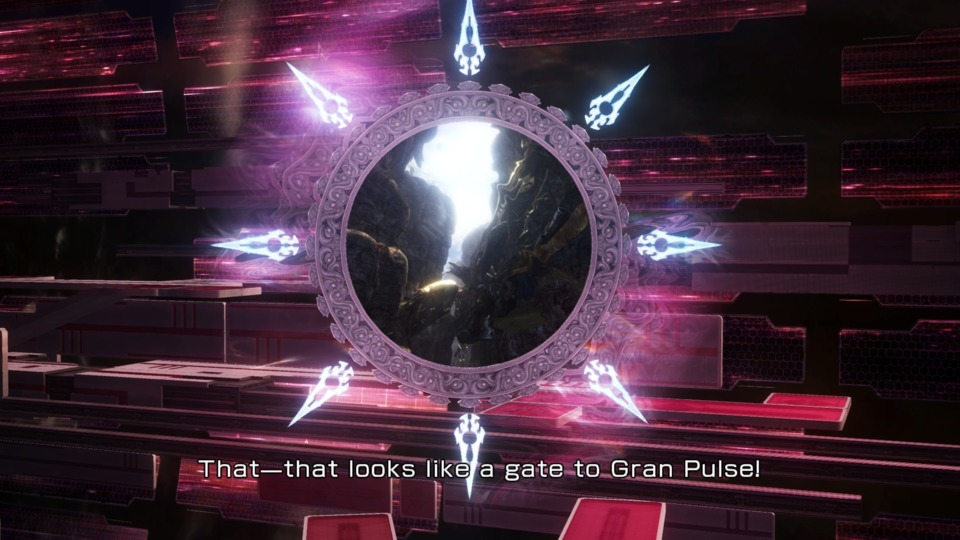
Honestly, I suspect Square remind you of Gran Pulse's existence out of self-preservation. They likely spent more of their resources making Gran Pulse than any other level and didn't want their hard work to be limited to one chapter. Indeed, I cannot blame them of thinking that highly of the environment. Be that as it may, providing the player with a reason to revisit Gran Pulse wouldn't have been that hard. As it stands, the portal to Gran Pulse exists for the sake of it. Should you enter it, you do so without any real reason or motivation. That said, I did, and HOLY SHIT did I regret it.
Part 46: The Optional Content Is Horrible
No matter what you think of what I'm saying, remember this one thing: do not play Final Fantasy XIII's optional content. Also, there's no sex in the champagne room. Regardless, returning to Gran Pulse is not fun and necessitates hours of mindless grinding. Likewise, most of the side quests are impossible until AFTER you beat the game. A point worth mentioning is the final levels of the Crystarium do not unlock until after you beat the last boss. As mentioned in the previous episode, this design decision is unconscionable because much of Pulse's worldbuilding is locked in the side quests.
Before any of you claim I am crying over spilled milk, I want to say something. I spent eighty-three hours playing Final Fantasy XIII. Three and a half days of my life were spent playing Final Fantasy XIII. I'm never getting those hours back. If I sound bitter, it is because I am. In spite of these hours, I have very little to show for it. If anything, I have permanently lost whole portions of my humanity.

In the previous episode, I ranted considerably about the structure of the Cei'th Stone missions so I will not be doing that here. All I will say is you spend most of your time running between sub-environments and trying to make sense of the world map. What I want to spend time discussing are the enemy encounters. More specifically, I want to pontificate about the Undying bosses. To the game's credit, these Cie'th maintain a consistent art style and add variety to the repetitious enemy encounters on Gran Pulse. Alternatively, they repeat similar enough move sets where they start to become a blur.
Even so, there's a bigger issue with these boss battles. I beat three or four of these monsters, and I cannot tell you what they add to the story. These abominations appear before you, and you fight them immediately. While they have introductory cutscenes, there's a shocking lack of expository dialogue. As a result, there's no grounding as to why these battles occur, or what impact these Cie'th have on the greater world. For pity's sake, the Codex regurgitates paragraphs of bloodless text about them being fearsome foes. For lack of a better word, these battles happen, and then they end. They are as abrupt as the directions to a Shakespearean fight scene.
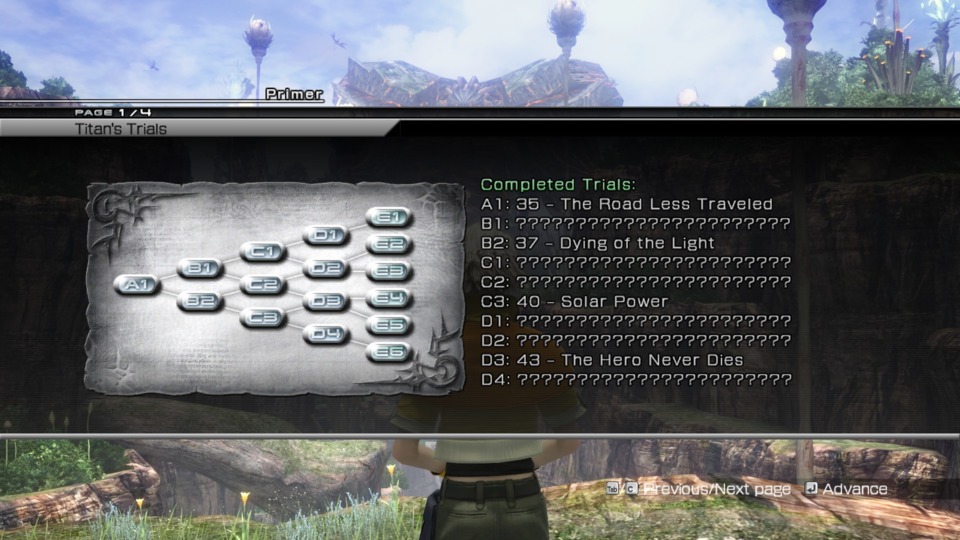
Let's talk about the Titan Trials. Not since Final Fantasy XII, has optional content in a Final Fantasy game so thoroughly waste my time. For those of you not "in the know," the Titan Trials are a series of side quests packaged in a set of branching pathways. The problem here is that the Titan Trials call for a great deal of repetition. At a minimum, you'll run through the trails six times. The culminating bosses for each path are no slouch either. Several are harder than anything encountered in the mainline story. Finally, the reward for completing the Titan Trials is debatable. You learn more about the fal'Cie Titan, but this doesn't shed new light on the state of Gran Pulse.
Part 47: The Last Level Is Bullshit
I cannot emphasize enough, this is the last fucking level in the game, and it plays exactly like the first fucking level. How did Square-Enix think this level design was acceptable? The only way you interact with the environment is by switching the platforms. There are Cie'th to kill and treasure chests to open, but that's all you can do. For fuck's sake, at least Final Fantasy X-2 had the common courtesy to include an environmental puzzle from time to time. They were bullshit puzzles, but at least they tried!
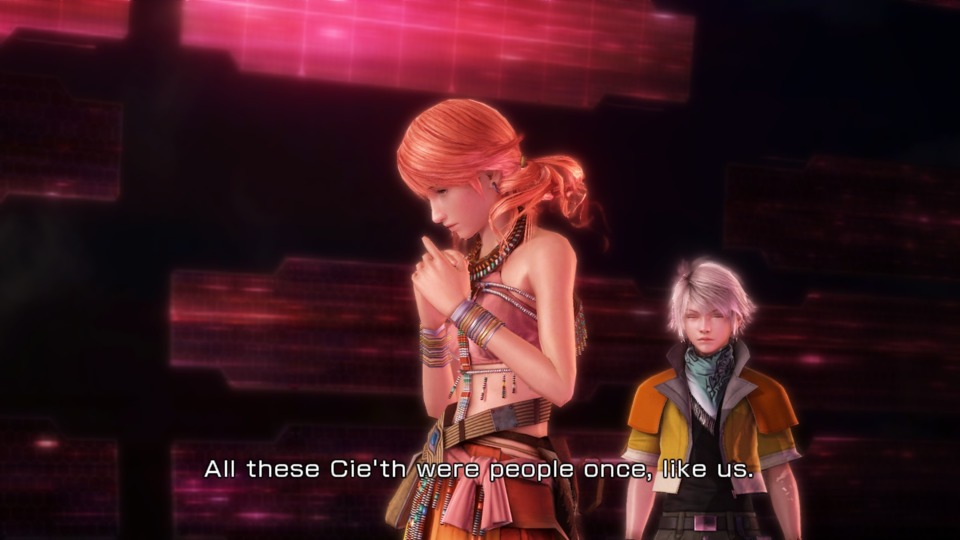
The Final Fantasy franchise has a long and storied history of having the best final levels in video games. Whether we are talking about the 2D or CG-era, Square-Enix knows how to end a video game. The fact they repeat the same corridor design to Final Fantasy XIII's end is a testament to them being out of their element. Case and point, there are three mid-bosses before you encounter Barthandelus, and I have no idea how they relate to the story. I do not understand who "Wladislaus" is, nor do I know why I'm fighting them.
Top to bottom, Final Fantasy XIII is designed with no end-goal in mind. Square negligently copied their tired and true Final Fantasy design document to disastrous effect. With large swaths of Final Fantasy XIII undeveloped, many franchise tropes do not work as intended. For instance, why are two of the mid-bosses named after Lewis Carroll characters? Am I meant to parse a message from our two battles against the Bandersnatch and Jabberwocky? More so, why are we fighting these monsters? How did these beasts get here? What am I doing with my life?
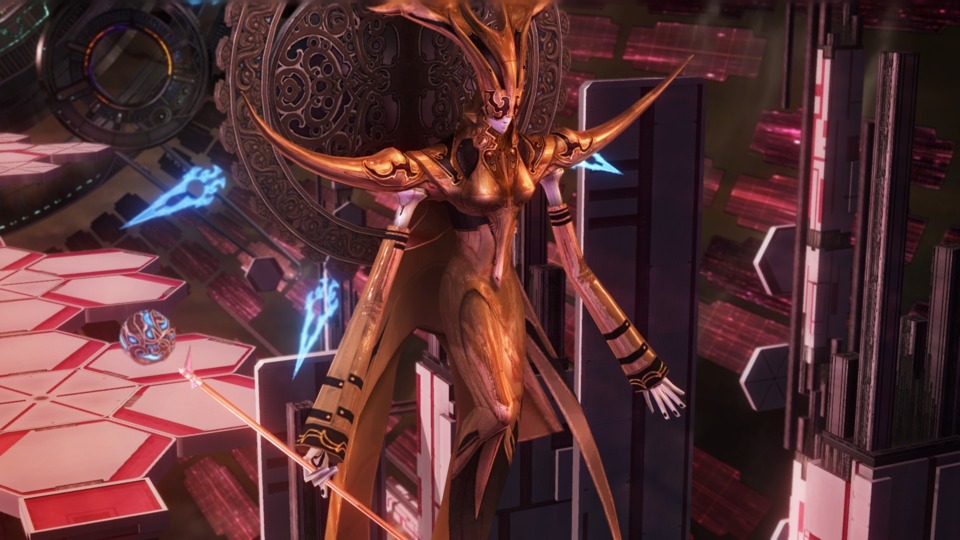
I get several of you dislike it when I compare Final Fantasy XIII to Final Fantasy IX, and it is an unfair comparison for a myriad of reasons. However, there's a point I want to make. At the end of Final Fantasy IX, you fight a series of bosses known as the "Four Fiends." Each of these abominations has a reason to support Kuja in his quest to set the world on fire. Their logic is articulated to the audience before, during, and after you fight them. This format has been a template Final Fantasy has used since its inception. For some fucking reason, Final Fantasy XIII bucks this trend. It tosses four bosses at your direction with no provided context.
Eventually, I found myself in front of the door to the final boss. I stood in front of this door for a solid five minutes. In that time I wracked my brain over why I was about to kill Barthandelus. I knew I had to beat him, but the supporting details were a mystery to me. I could not figure out what prepared me for this battle. While it is apt to showcase flashy cutscenes or high-resolution character models, Final Fantasy XIII leaves whole portions of its narrative in shambles. Which leads me to my next big question:
Part 48: What The Fuck Is This Story?
I have groused enough about the underpinning of Final Fantasy XIII not making sense. What I want to address now is Final Fantasy XIII's nightmarish final level. To be honest with you, I have no idea what happened during the final battle against Barthandelus. At one point everyone was a Cie'th, and in the next scene, they were back to normal. It was a fever dream unlike any I have seen before, and I finished Final Fantasy VIII. I should be used to Final Fantasy games getting crazy, but in this case, I felt woefully inept.
The final battle starts innocently enough. Lightning and company approach Barthandelus' throne, and he spews his usual nonsense about bringing forth a more peaceful universe. The one complication is Barthandelus extols a ton of dialogue about Cocoon being a "fabrication." Barthandelus rationalizes his actions by claiming he's trying to free the universe from a "simulation." This story arc is the only found in this one scene, and the game never mentions it again.
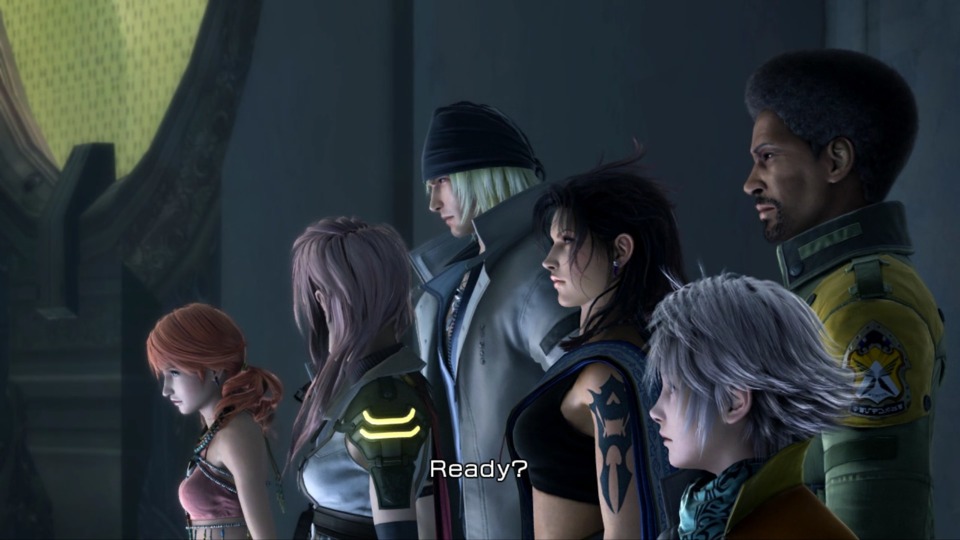
I cannot preface enough how shitty the lines of dialogue are when you confront Barthandelus. Every character has to respond to Barthandelus with a dramatic retort. Sazh and Hope are the worst offenders, but the one-liners are terrible across the board. To add to the "cheese factor," the characters strikes poses as if they are actors in a Super Sentai show. Regardless, you end up fighting Barthandelus and it's a predictable slog. Worth noting, Barthandelus wants us to fight him because he believes his death will inspire "The Maker" to create a new universe. Nonetheless, no one stops to think about this point, and carries forward with the battle.
When the first battle ends, things start to get "messy." Barthandelus goads the characters to continue with their onslaught, but if that's the case, why is he fighting them in the first place? If Barthandelus and Orphan want to die, why do they pose such a challenge? Things get even more confusing when an owl flies out of nowhere, merges with Barthandelus, and transforms him into a talking sword. This flying sword declares itself "Orphan" and compliments the player for commencing the world's "redemption." I'm not lying. This scene actually happens in the game.
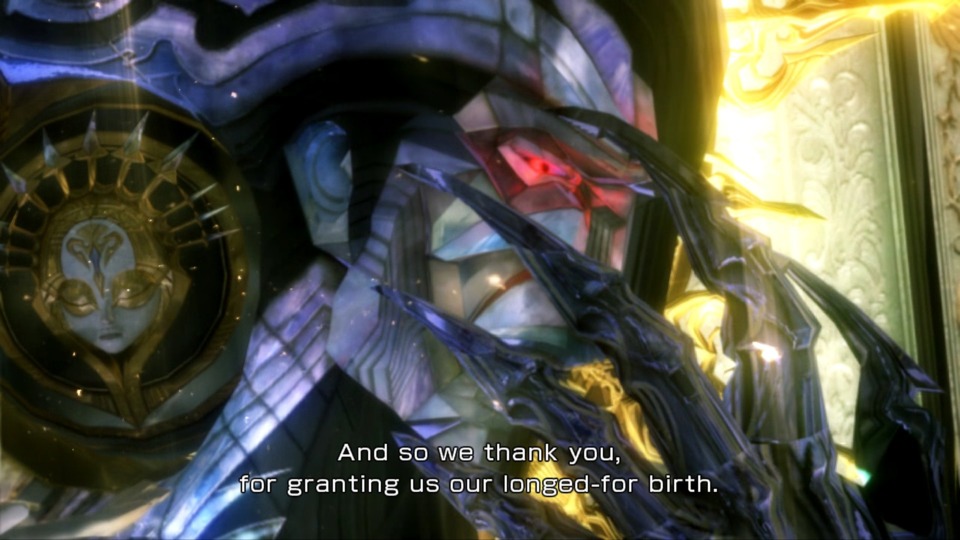
I have questions. I have a lot of questions. Who or what was the owl that fused with Barthandelus? Who or what is Orphan? Why does Orphan put up a fight if it wants to die? Why does Orphan wish to end the world? What's the deal with the black goo that merges the owl with Barthandelus? Are all the fal'Cie on board with Barthandelus' plan? What does turning Fang into Ragnarok have to due with Orphan? Do any of these questions have answers?
Speaking of Orphan, this may be the worst designed Final Fantasy boss. In fact, this entire battle is an overwhelming sensory overload. Remarkably, the game crams in storytelling by having Orphan bellow about the purpose of the fal'Cie. As it shrieks about the "indomitable force" of humanity, it demands Fang turn into Ragnarok. To force her into unleashing the end of the world, it lifts Vanille into the air and begins torturing her. Wanting to put a stop to this, Fang consents and betrays her friends.
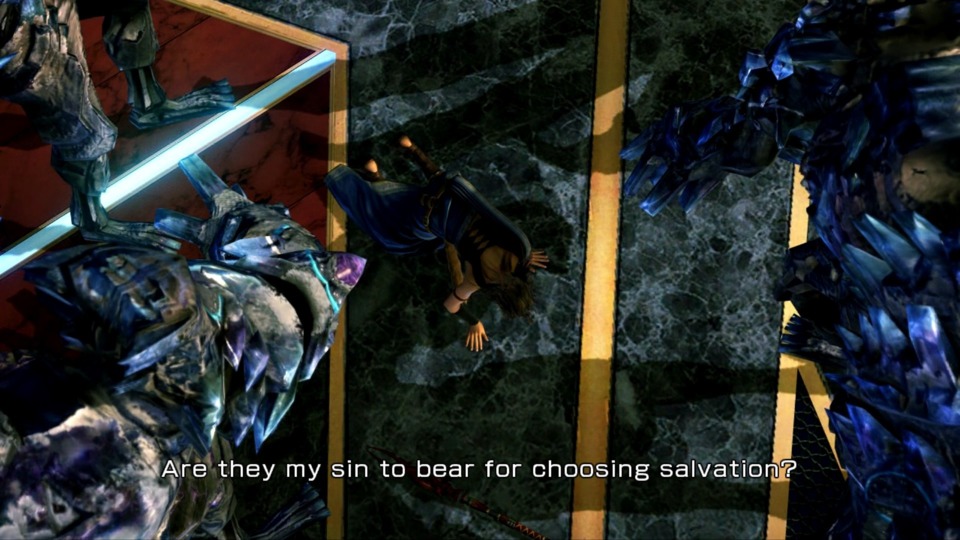
It goes without saying Fang's betrayal makes no sense. Does she realize becoming Ragnarok ends the world? Isn't the better solution to attack Orphan? How is Fang going to enjoy life with Vanille if the universe doesn't exist? At any rate, when Fang betrays her friends they turn into Cie'th and start beating her up. Why did everyone turn into Cie'th? The game doesn't care to answer that question, and instead has Fang bawl about needing to "atone for her sins." The line reading is as bad as you can imagine.
Overcome with emotion; Fang turns into Ragnarok. As Ragnarok, Fang wails on Orphan who goes full masochist and welcomes the deadly blows. After that, Fang experiences a flashback and remembers every moment in the story leading up to this point. Due to these flashbacks, Fang regains her humanity and ceases being Ragnarok. Infuriated, Orphan lifts Fang into the air and demands she revert to being Ragnarok. As Orphan tortures Fang, the rest of the party magically appears unscathed and frees Fang from the clutches of Orphan. Sazh tells us the previous scene was "fal'Cie smoke and mirrors." The game then treats us to the worst line of dialogue I have seen in a AAA video game.
Everyone in our party affirms the need to defeat Orphan post-haste. It is, after all, their "destiny." However, the issue of Orphan's death summoning "The Maker" is dropped like a ton of bricks. Now, killing Orphan will release humanity from its Sisyphean torment. I honestly do not understand what is happening anymore. Ten minutes ago, killing Orphan ended the world, and now killing Orphan will save the world. Is this game secretly about saying "no" to suicide? The characters spend so much time chastizing Orphan for thinking death is a release, that's the impression I had.
Part 49: The End? Wait, There Are Sequels?
Our party has a few choice words with Orphan's final form. For one thing, they accuse it of poisoning Cocoon from within, a point not at all made during the story. Lightning plainly says humanity's real strength comes from its willingness to try new things when confronted with failure. After that, the cast collectively declares that their focus is to defeat Orphan. Wait a minute, didn't Barthandelus give them their focus? When did they learn how to change their focus on a whim? You know what? I'm not doing this play-by-play commentary about the story anymore. It's exhausting, and we are ten minutes away from the ending.
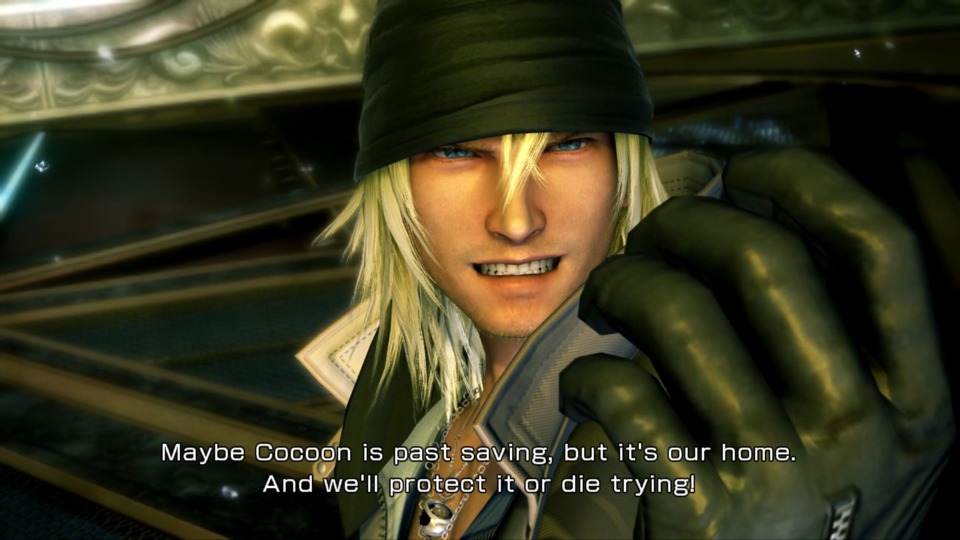
The last two boss battles are a slice of Hell. It's virtually impossible to take down Orphan's first form without buffs and debuffs. That said, Orphan can reverse status effects with relative ease, thus negating hard work and careful planning. Equally important, Orphan has an attack that automatically brings your party's HP to 1. That attack mixed with Orphan's ability to cast poison is a lethal combination. Speaking of which, Orphan casts Doom when its health is low. In short, both battles employ a flurry of cheap shit that arbitrarily makes the end of the game harder than it needs to be.
Final battles in role-playing games are meant to be empowering. After slogging through Hell and high water, your party should be robust enough to take on an army. They should have at their disposal remarkable abilities both physical and magical. For a game's end to rely this heavily on cheap bullshit is beyond disappointing. More importantly, using such tactics hampers the player's ability to enjoy their victory. When I beat Orphan, I didn't feel a sense of accomplishment. When I survived both battles, I felt like I got lucky.
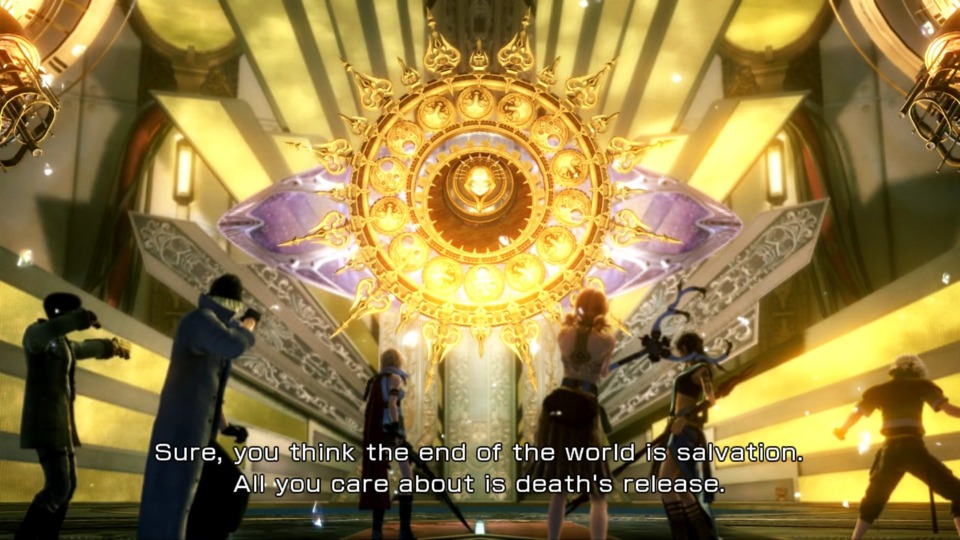
As Orphan sinks into a pit of acid, the characters teleport to Edenhall. They seemingly overcame their destiny, but what that destiny was is never clear. As the characters are lifted into the air, Fang and Vanille fuse to form Ragnarok. While in their Ragnarok form, Fang and Vanille attempt to save humanity. To accomplish this, we watch Ragnarok tunnel into Pulse, causing lava to shoot from its mantle and into space. This lava causes everything on Cocoon to crystallize, including our party members. Fang and Vanille's sacrifice prevents Cocoon from crashing into Pulse and wiping out all life as we know it. However, Fang and Vanille return to a crystal stasis.
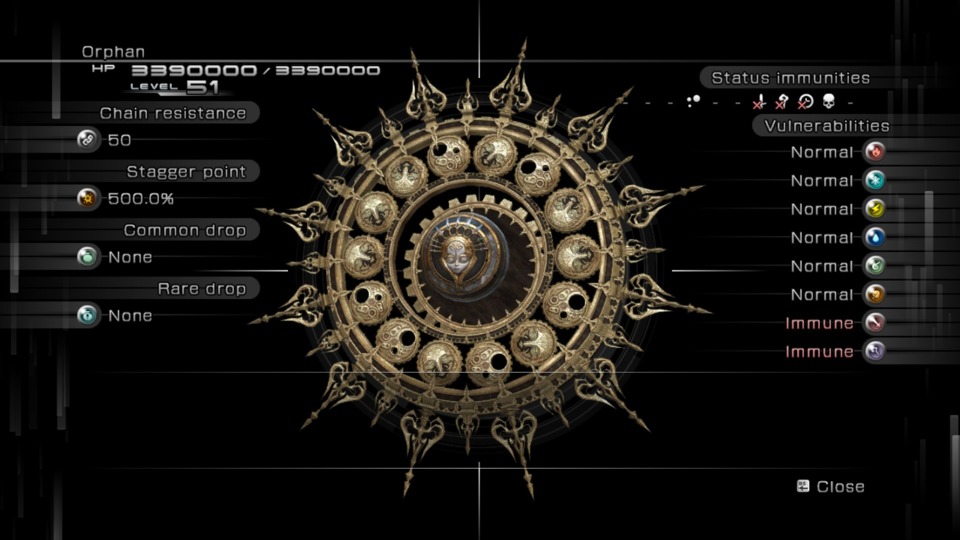
As we marvel over the glasswork on Cocoon, the game transitions back to Pulse. Once there, we watch Lightning and company recover from their crystal state. Lightning, Hope, Snow, and Sazh wake up and notice their brands no longer exist. What causes this miracle to happen? The world will never know. As they explore their surroundings, they find out the citizens of Cocoon evacuated to Pulse and everyone important to the story survived the ending of the game. For example, Serah and Dajh greet our remaining cast members in a dramatic display during the game's conclusion. With their friends in tow, everyone endeavors to rebuild Pulse and carve a new life in honor of Vanille and Fang's sacrifice.
Oh, and some low-rent Beyoncé knock-off starts wailing about make-up and lost relationships. Both fitting musical topics for a Final Fantasy game.
Part 50: This Is The Worst AAA Game Ever Made
The gall of Square-Enix's shortsightedness is stunning. Final Fantasy XIII spends most of its time shunting you through corridor after corridor. and to what end? Its linearity doesn't act as a scaffold for its cast of characters. The vast majority of the characters remain as bland as when they were first introduced. Do the hallways help to create a better sense of place as they did in Final Fantasy X? No, and to make matters worse, the game spends hours of your time meandering with its nonsensical plot.
I toyed around with the "New Game Plus" content and reached a stunning conclusion. After playing the game for eighty-plus hours, I couldn't tell you what I had to show for my time. I didn't have a trinket to showcase, nor could I brag about beating a stunning boss. Final Fantasy XIII is a game that happened, and it cannot un-happen. Nothing you accomplish signifies anything resolute or tangible. If anything, the entire game is a complete aberration. It physically exists, while also being indescribable.
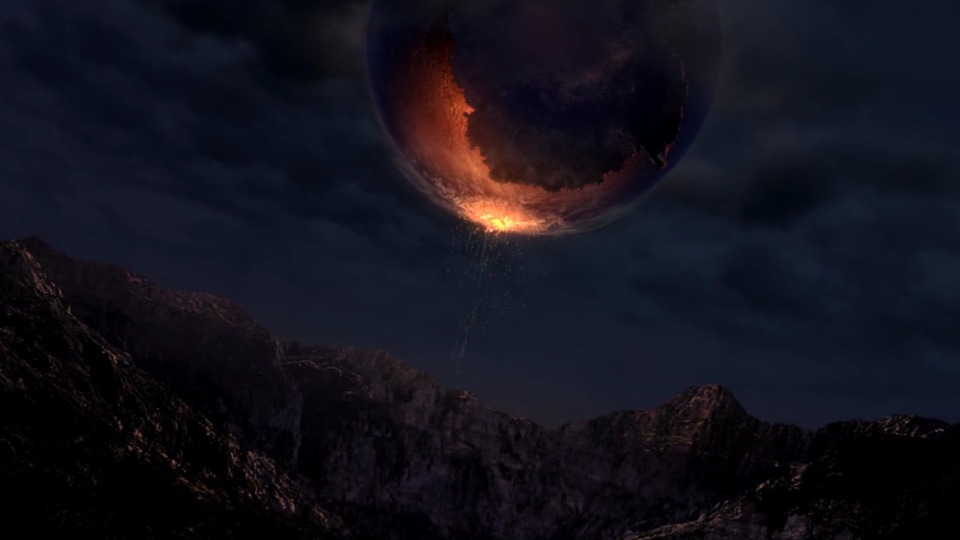
I cannot frame any part of Final Fantasy XIII in a positive light. I hate its gameplay, characters, pacing, and story. I despise the gameplay because it doesn't open up until the twelfth chapter of a thirteen chapter story. When it does open up, it does so to mixed results. The class system isn't dynamic nor does it solidify the utility of the characters. The Crystarium is shockingly static and takes forever to bear fruit. While there are sub-systems and hidden depth, the results are the same. You click attacks and watch your characters flail around in a three-dimensional plane. Because of its design, you feel removed from the action and barely have an opportunity to enjoy battles as they evolve.
Characters and story usually go hand in hand in a role-playing game, but that isn't the case in Final Fantasy XIII. Our motley crew does not evolve and at no point do we have a clear understanding of their viewpoints. After spending days controlling Snow and Hope, I didn't walk away with an understanding of their outlooks on life. That's due to the game's characters being more interested in spewing one-liners than exploring their surroundings. My lack of investment in their melodrama is the result of this shortcoming.
What about Final Fantasy XIII's story? Several JRPGs have salvaged their moribund casts with epic stories. Unfortunately, Final Fantasy XIII's story is downright incomprehensible. It somehow transitions from being a story about leading a resistance movement to one about stopping the Apocalypse. Furthermore, nothing you accomplish in Final Fantasy XIII sticks with you. This point is incomprehensible for a Final Fantasy game. For as bizarre and zany as Final Fantasy VII, VIII, or X can be, they are undeniably memorable.
And the story meanders. It meanders and wastes your time on soulless character moments unrelated to the main story. When it finally zeroes in on its raison d'être, it becomes an unintelligible nightmare. Worse, the game puts the responsibility of contextualizing the world in your hands. Large swaths of Cocoon remain contextless unless you take the time to read bland codex entries. What is more, Final Fantasy XIII is afflicted with the worst case of "proper noun syndrome" I have ever seen. When it lectures you, it spews mountains of information with no provided wait time. Top to bottom, Final Fantasy XIII is a clear-cut case of storytelling maleficence.
This game was meant to be our introduction to the "Fabula Nova Crystallis" universe. Sequels, prequels, and mobile tie-ins were intended to build upon the accomplishments of Final Fantasy XIII. After this game launched, everything Square made acted as damage control. Furthermore, this game threw Square into a technological bottleneck. Admittedly, this game is a technical marvel. Even so, Square spent a decade wasting away in a single universe with no hope of getting out.
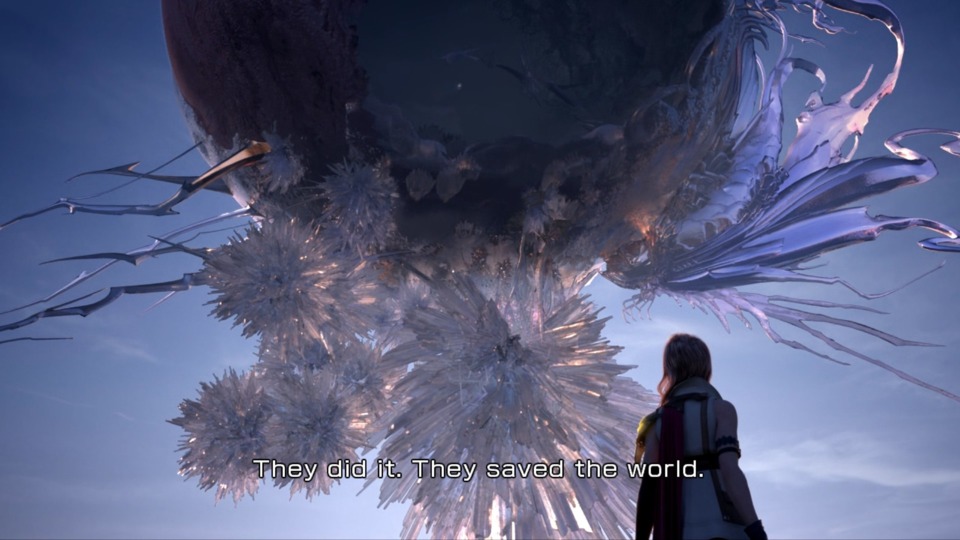
Square-Enix, a highly revered developer, spent five years programming this tire fire. The result is unmistakable; Square has been paying off this disaster for ten years. The days of Square-Enix releasing three Final Fantasy games per console cycle are dead. Final Fantasy XIII killed the golden era of Square. Look at their sorry ass state today. The vast majority of their income comes from Gacha games and iOS dogshit. When they do strike gold, they unlearn any positive lessons there could have been. All of you championing Octopath Traveler should think about how many times Square has been applauded for going back to their roots. For fuck's sake, the Kingdom Hearts franchise is a slow-moving car crash!
And what of the Final Fantasy franchise? It too is a walking zombie. From thirteen forward, they have continued to use their MMORPG games as a template rather than a cautionary tale for their single-player focused experiences. Furthermore, the Final Fantasy series is a laughing stock when it comes to storytelling and characters. The series is done taking risks and using characters for higher purposes. We're never going to see another Vivi or Jecht. Not with Square's current administration in-tact.
What's more, Square's quest to make Final Fantasy a multi-million dollar hit has had unintended consequences. Their stalwart JRPG series is accessible only to die-hard fans. Mainstream audiences aren't clamoring to play a new Final Fantasy game as they did with Final Fantasy VII or X. To top it all off, I don't know if Square realizes how far they missed the mark on this game. With new entries of the series focused on gameplay over story, what bones are they throwing to old-time fans?
The worst part is there's no going back. The leadership of Square have no intention of maturing with its audience, and Final Fantasy XV makes that notion all but certain. As new ideas and people approach the JRPG genre, Square thinks their old song and dance will appeal to a younger demographic that is increasingly less interested in JRPGs. In that regard, they are the Weezer and Green Day of video games. Sadly, it's not working, and their mistakes are becoming increasingly harder and harder to watch.
It pains me to say this, but the dream is dead, and none of us attended the funeral.
